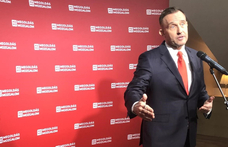Chairman of Freedom House
Peter Ackerman expects Freedom House's latest report on the state of civil liberties in America to be heavily criticised. The 59-year-old claims to be glad if the odd country complains about its 'grade' - it proves that his organisation has weight.
HVG: Freedom House has been assessing the state of democracy and civil liberties around the world for 33 years. You give grades from 1 to 7. On what basis? What are your sources?
PA: The beauty of it is that freedom can be broken down into its elements and measured. You can assess the freedom of the press, of religion, the independence of the courts, whether civil rights are guaranteed. We commission regional experts to work according to a strict set of criteria that we prepare. But there are plenty of arguments over whether our reports are fair. It can happen that countries appeal against there low grade. That's great! It means they're paying us attention...We're never going to have everyone satisfied with our reports. Our report on civil liberties in America is going to attract a lot of criticism...
HVG: On your website it says of your governors: "We are united in our view that America's leading role in the world is essential from the point of view of human rights and freedom." So you represent Washington's interests, not universal human values?
PA: You can't be a leader if nobody follows. Whilst you can focus your energy on spreading freedom, you can't force it on others, you can't tell people that you're taking them somewhere they don't want to go...Though we get support from the American government - and we'd like to cut that down in the name of objectivity and independence - we've never got a call from the State Department telling us what to do. The board of governors is a bilateral body, with people like Thomas Foley, a former Speaker of Congress, Anthony Lake, President Clinton's one-time National Security Adviser, Mark Palmer, who was Ambassador to Budapest under George Bush Sr. They have diverse views, but all of them are free-thinking people who believe that Freedom House is beneficial for the US and that being free is a natural right.
HVG: In its most recent report on Eastern Europe, Freedom House writes that authoritarian governance is making a comeback in some former Soviet republics. Is this unavoidable in young independent states whose politicians learned their trade over decades of harsh dictatorship?
PA: You see these attempts at authoritarianism because people expect the state to do everything for them. The main question is who has rights: the individual or the state. America's order is based on the idea of people having fundamental rights, and that they give power to the state. In the cases you mention it's the other way round. So what's happening is not surprising in the least. Important changes, like the end of the Cold War or the departure of former Ukrainian president Kuchma, do not necessarily change people's mentality or their relationship to the state. But with time they may change their view of what they can expect from the state and what rights they have. Because we live in a globalising world, and if people want to be free but don't know how to bring this about, then they can see good examples.













